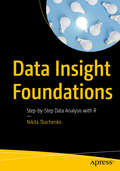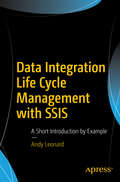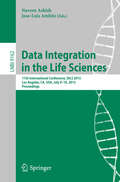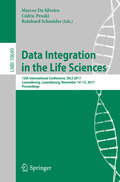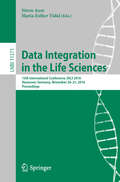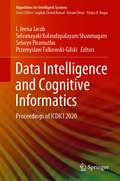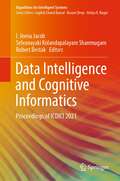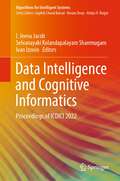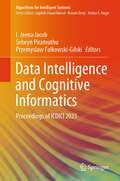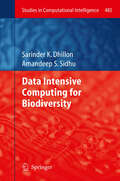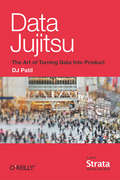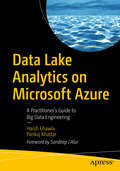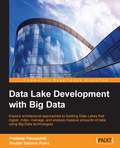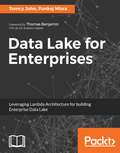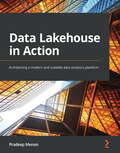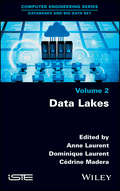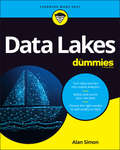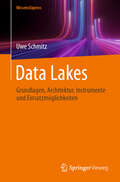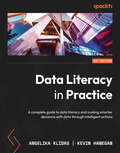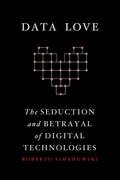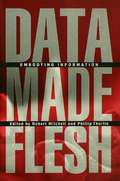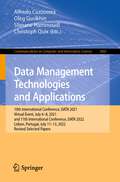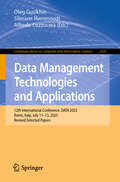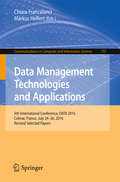- Table View
- List View
Data Insight Foundations: Step-by-Step Data Analysis with R
by Nikita TkachenkoThis book is not a comprehensive guide; if that's what you're seeking, you may want to look elsewhere. Instead, it serves as a map, outlining the necessary tools and topics for your research journey. The goal is to build your intuition and provide pointers for where to find more detailed information. The chapters are deliberately concise and to the point, aiming to expose and enlighten rather than bore you. While examples are primarily in R, a basic understanding of the language is advantageous but not essential. Several chapters, especially those focusing on theory, require no programming knowledge at all. Parts of this book have proven useful to a diverse audience, including web developers, mathematicians, data analysts, and economists, making the material beneficial regardless of one’s background The structure allows for flexible reading paths; you may explore the chapters in sequence for a systematic learning experience or navigate directly to the topics most relevant to you. What You Will Learn Data Management: Master the end-to-end process of data collection, processing, validation, and imputation using R. Reproducible Research: Understand fundamental theories and achieve transparency with literate programming, renv, and Git. Academic Writing: Conduct scientific literature reviews and write structured papers and reports with Quarto. Survey Design: Design well-structured surveys and manage data collection effectively. Data Visualization: Understand data visualization theory and create well-designed and captivating graphics using ggplot2 Who this Book is For Career professionals such as research and data analysts transitioning from academia to a professional setting where production quality significantly impacts career progression. Some familiarity with data analytics processes and an interest in learning R or Python are ideal.
Data Integration Life Cycle Management with SSIS: A Short Introduction By Example
by Andy LeonardBuild a custom BimlExpress framework that generates dozens of SQL Server Integration Services (SSIS) packages in minutes. Use this framework to execute related SSIS packages in a single command. You will learn to configure SSIS catalog projects, manage catalog deployments, and monitor SSIS catalog execution and history. Data Integration Life Cycle Management with SSIS shows you how to bring DevOps benefits to SSIS integration projects. Practices in this book enable faster time to market, higher quality of code, and repeatable automation. Code will be created that is easier to support and maintain. The book teaches you how to more effectively manage SSIS in the enterprise environment by drawing on the art and science of modern DevOps practices. What You'll Learn Generate dozens of SSIS packages in minutes to speed your integration projects Reduce the execution of related groups of SSIS packages to a single command Successfully handle SSIS catalog deployments and their projects Monitor the execution and history of SSIS catalog projects Manage your enterprise data integration life cycle through automated tools and utilities Who This Book Is For Database professionals working with SQL Server Integration Services in enterprise environments. The book is especially useful to those readers following, or wishing to follow, DevOps practices in their use of SSIS.
Data Integration in the Life Sciences: 11th International Conference, DILS 2015, Los Angeles, CA, USA, July 9-10, 2015, Proceedings (Lecture Notes in Computer Science #9162)
by Naveen Ashish Jose-Luis AmbiteThis book constitutes the proceedings of the 11th International Conference on Data Integration in the Life Sciences, DILS 2015, held in Los Angeles, CA, USA, in July 2015. The 24 papers presented in this volume were carefully reviewed and selected from 40 submissions. They are organized in topical sections named: data integration technologies; ontology and knowledge engineering for data integration; biomedical data standards and coding; medical research applications; and graduate student consortium.
Data Integration in the Life Sciences: 12th International Conference, DILS 2017, Luxembourg, Luxembourg, November 14-15, 2017, Proceedings (Lecture Notes in Computer Science #10649)
by Marcos Da Silveira Cédric Pruski Reinhard SchneiderThis book constitutes the proceedings of the 12th International Conference on Data Integration in the Life Sciences, DILS 2017, held in Luxembourg, in November 2017. The 5 full papers and 5 short papers presented in this volume were carefully reviewed and selected from 16 submissions. They cover topics such as: life science data modelling; analysing, indexing, and querying life sciences datasets; annotating, matching, and sharing life sciences datasets; privacy and provenance of life sciences datasets.
Data Integration in the Life Sciences: 13th International Conference, Dils 2018, Hannover, Germany, November 20-21, 2018, Proceedings (Lecture Notes in Computer Science #11371)
by Maria-Esther Vidal Sören AuerThis book constitutes revised selected papers from the 13th International Conference on Data Integration in the Life Sciences, DILS 2018, held in Hannover, Germany, in November 2018. The 5 full, 8 short, 3 poster and 4 demo papers presented in this volume were carefully reviewed and selected from 22 submissions. The papers are organized in topical sections named: big biomedical data integration and management; data exploration in the life sciences; biomedical data analytics; and big biomedical applications.
Data Intelligence and Cognitive Informatics: Proceedings of ICDICI 2020 (Algorithms for Intelligent Systems)
by Selwyn Piramuthu I. Jeena Jacob Selvanayaki Kolandapalayam Shanmugam Przemyslaw Falkowski-GilskiThis book discusses new cognitive informatics tools, algorithms and methods that mimic the mechanisms of the human brain which lead to an impending revolution in understating a large amount of data generated by various smart applications. The book is a collection of peer-reviewed best selected research papers presented at the International Conference on Data Intelligence and Cognitive Informatics (ICDICI 2020), organized by SCAD College of Engineering and Technology, Tirunelveli, India, during 8–9 July 2020. The book includes novel work in data intelligence domain which combines with the increasing efforts of artificial intelligence, machine learning, deep learning and cognitive science to study and develop a deeper understanding of the information processing systems.
Data Intelligence and Cognitive Informatics: Proceedings of ICDICI 2021 (Algorithms for Intelligent Systems)
by Robert Bestak I. Jeena Jacob Selvanayaki Kolandapalayam ShanmugamThe book is a collection of peer-reviewed best selected research papers presented at the International Conference on Data Intelligence and Cognitive Informatics (ICDICI 2021), organized by SCAD College of Engineering and Technology, Tirunelveli, India, during July 16–17, 2021. This book discusses new cognitive informatics tools, algorithms, and methods that mimic the mechanisms of the human brain which leads to an impending revolution in understating a large amount of data generated by various smart applications. The book includes novel work in data intelligence domain which combines with the increasing efforts of artificial intelligence, machine learning, deep learning, and cognitive science to study and develop a deeper understanding of the information processing systems.
Data Intelligence and Cognitive Informatics: Proceedings of ICDICI 2022 (Algorithms for Intelligent Systems)
by I. Jeena Jacob Selvanayaki Kolandapalayam Shanmugam Ivan IzoninThe book is a collection of peer-reviewed best selected research papers presented at the International Conference on Data Intelligence and Cognitive Informatics (ICDICI 2021), organized by SCAD College of Engineering and Technology, Tirunelveli, India, during July 6–7, 2022. This book discusses new cognitive informatics tools, algorithms and methods that mimic the mechanisms of the human brain which lead to an impending revolution in understating a large amount of data generated by various smart applications. The book includes novel work in data intelligence domain which combines with the increasing efforts of artificial intelligence, machine learning, deep learning and cognitive science to study and develop a deeper understanding of the information processing systems.
Data Intelligence and Cognitive Informatics: Proceedings of ICDICI 2023 (Algorithms for Intelligent Systems)
by Selwyn Piramuthu I. Jeena Jacob Przemyslaw Falkowski-GilskiThe book is a collection of peer-reviewed best selected research papers presented at the International Conference on Data Intelligence and Cognitive Informatics (ICDICI 2023), organized by SCAD College of Engineering and Technology, Tirunelveli, India, during June 27–28, 2023. This book discusses new cognitive informatics tools, algorithms and methods that mimic the mechanisms of the human brain which lead to an impending revolution in understating a large amount of data generated by various smart applications. The book includes novel work in data intelligence domain which combines with the increasing efforts of artificial intelligence, machine learning, deep learning and cognitive science to study and develop a deeper understanding of the information processing systems.
Data Intensive Computing for Biodiversity (Studies in Computational Intelligence #485)
by Sarinder K. Dhillon Amandeep S. SidhuThis book is focused on the development of a data integration framework for retrieval of biodiversity information from heterogeneous and distributed data sources. The data integration system proposed in this book links remote databases in a networked environment, supports heterogeneous databases and data formats, links databases hosted on multiple platforms, and provides data security for database owners by allowing them to keep and maintain their own data and to choose information to be shared and linked. The book is a useful guide for researchers, practitioners, and graduate-level students interested in learning state-of-the-art development for data integration in biodiversity.
Data Jujitsu: The Art of Turning Data into Product
by Dj PatilAcclaimed data scientist DJ Patil details a new approach to solving problems in Data Jujitsu.Learn how to use a problem's "weight" against itself to:Break down seemingly complex data problems into simplified partsUse alternative data analysis techniques to examine themUse human input, such as Mechanical Turk, and design tricks that enlist the help of your users to take short cuts around tough problemsLearn more about the problems before starting on the solutions—and use the findings to solve them, or determine whether the problems are worth solving at all.
Data Lake Analytics on Microsoft Azure: A Practitioner's Guide to Big Data Engineering
by Harsh Chawla Pankaj KhattarGet a 360-degree view of how the journey of data analytics solutions has evolved from monolithic data stores and enterprise data warehouses to data lakes and modern data warehouses. You willThis book includes comprehensive coverage of how:To architect data lake analytics solutions by choosing suitable technologies available on Microsoft AzureThe advent of microservices applications covering ecommerce or modern solutions built on IoT and how real-time streaming data has completely disrupted this ecosystemThese data analytics solutions have been transformed from solely understanding the trends from historical data to building predictions by infusing machine learning technologies into the solutionsData platform professionals who have been working on relational data stores, non-relational data stores, and big data technologies will find the content in this book useful. The book also can help you start your journey into the data engineer world as it provides an overview of advanced data analytics and touches on data science concepts and various artificial intelligence and machine learning technologies available on Microsoft Azure.What Will You LearnYou will understand the:Concepts of data lake analytics, the modern data warehouse, and advanced data analyticsArchitecture patterns of the modern data warehouse and advanced data analytics solutionsPhases—such as Data Ingestion, Store, Prep and Train, and Model and Serve—of data analytics solutions and technology choices available on Azure under each phaseIn-depth coverage of real-time and batch mode data analytics solutions architectureVarious managed services available on Azure such as Synapse analytics, event hubs, Stream analytics, CosmosDB, and managed Hadoop services such as Databricks and HDInsightWho This Book Is ForData platform professionals, database architects, engineers, and solution architects
Data Lake Development with Big Data
by Pradeep Pasupuleti Beulah Salome PurraExplore architectural approaches to building Data Lakes that ingest, index, manage, and analyze massive amounts of data using Big Data technologies About This Book * Comprehend the intricacies of architecting a Data Lake and build a data strategy around your current data architecture * Efficiently manage vast amounts of data and deliver it to multiple applications and systems with a high degree of performance and scalability * Packed with industry best practices and use-case scenarios to get you up-and-running Who This Book Is For This book is for architects and senior managers who are responsible for building a strategy around their current data architecture, helping them identify the need for a Data Lake implementation in an enterprise context. The reader will need a good knowledge of master data management, information lifecycle management, data governance, data product design, data engineering, and systems architecture. Also required is experience of Big Data technologies such as Hadoop, Spark, Splunk, and Storm. What You Will Learn * Identify the need for a Data Lake in your enterprise context and learn to architect a Data Lake * Learn to build various tiers of a Data Lake, such as data intake, management, consumption, and governance, with a focus on practical implementation scenarios * Find out the key considerations to be taken into account while building each tier of the Data Lake * Understand Hadoop-oriented data transfer mechanism to ingest data in batch, micro-batch, and real-time modes * Explore various data integration needs and learn how to perform data enrichment and data transformations using Big Data technologies * Enable data discovery on the Data Lake to allow users to discover the data * Discover how data is packaged and provisioned for consumption * Comprehend the importance of including data governance disciplines while building a Data Lake In Detail A Data Lake is a highly scalable platform for storing huge volumes of multistructured data from disparate sources with centralized data management services. It eliminates the need for up-front modeling and rigid data structures by allowing schema-less writes. Data Lakes make it possible to ask complex far-reaching questions to find out hidden data patterns and relationships. This book explores the potential of Data Lakes and explores architectural approaches to building data lakes that ingest, index, manage, and analyze massive amounts of data using batch and real-time processing frameworks. It guides you on how to go about building a Data Lake that is managed by Hadoop and accessed as required by other Big Data applications such as Spark, Storm, Hive, and so on, to create an environment in which data from different sources can be meaningfully brought together and analyzed. Data Lakes can be viewed as having three capabilities--intake, management, and consumption. This book will take readers through each of these processes of developing a Data Lake and guide them (using best practices) in developing these capabilities. It will also explore often ignored, yet crucial considerations while building Data Lakes, with the focus on how to architect data governance, security, data quality, data lineage tracking, metadata management, and semantic data tagging. By the end of this book, you will have a good understanding of building a Data Lake for Big Data. You will be able to utilize Data Lakes for efficient and easy data processing and analytics. Style and approach Data Lake Development with Big Data provides architectural approaches to building a Data Lake. It follows a use case-based approach where practical implementation scenarios of each key component are explained. It also helps you understand how these use cases are implemented in a Data Lake. The chapters are organized in a way that mimics the sequential data flow evidenced in a Data Lake.
Data Lake for Enterprises
by Pankaj Misra Tomcy JohnA practical guide to implementing your enterprise data lake using Lambda Architecture as the base About This Book • Build a full-fledged data lake for your organization with popular big data technologies using the Lambda architecture as the base • Delve into the big data technologies required to meet modern day business strategies • A highly practical guide to implementing enterprise data lakes with lots of examples and real-world use-cases Who This Book Is For Java developers and architects who would like to implement a data lake for their enterprise will find this book useful. If you want to get hands-on experience with the Lambda Architecture and big data technologies by implementing a practical solution using these technologies, this book will also help you. What You Will Learn • Build an enterprise-level data lake using the relevant big data technologies • Understand the core of the Lambda architecture and how to apply it in an enterprise • Learn the technical details around Sqoop and its functionalities • Integrate Kafka with Hadoop components to acquire enterprise data • Use flume with streaming technologies for stream-based processing • Understand stream- based processing with reference to Apache Spark Streaming • Incorporate Hadoop components and know the advantages they provide for enterprise data lakes • Build fast, streaming, and high-performance applications using ElasticSearch • Make your data ingestion process consistent across various data formats with configurability • Process your data to derive intelligence using machine learning algorithms In Detail The term "Data Lake" has recently emerged as a prominent term in the big data industry. Data scientists can make use of it in deriving meaningful insights that can be used by businesses to redefine or transform the way they operate. Lambda architecture is also emerging as one of the very eminent patterns in the big data landscape, as it not only helps to derive useful information from historical data but also correlates real-time data to enable business to take critical decisions. This book tries to bring these two important aspects — data lake and lambda architecture—together. This book is divided into three main sections. The first introduces you to the concept of data lakes, the importance of data lakes in enterprises, and getting you up-to-speed with the Lambda architecture. The second section delves into the principal components of building a data lake using the Lambda architecture. It introduces you to popular big data technologies such as Apache Hadoop, Spark, Sqoop, Flume, and ElasticSearch. The third section is a highly practical demonstration of putting it all together, and shows you how an enterprise data lake can be implemented, along with several real-world use-cases. It also shows you how other peripheral components can be added to the lake to make it more efficient. By the end of this book, you will be able to choose the right big data technologies using the lambda architectural patterns to build your enterprise data lake. Style and approach The book takes a pragmatic approach, showing ways to leverage big data technologies and lambda architecture to build an enterprise-level data lake.
Data Lakehouse in Action: Architecting a modern and scalable data analytics platform
by Pradeep MenonPropose a new scalable data architecture paradigm, Data Lakehouse, that addresses the limitations of current data architecture patternsKey FeaturesUnderstand how data is ingested, stored, served, governed, and secured for enabling data analyticsExplore a practical way to implement Data Lakehouse using cloud computing platforms like AzureCombine multiple architectural patterns based on an organization's needs and maturity levelBook DescriptionThe Data Lakehouse architecture is a new paradigm that enables large-scale analytics. This book will guide you in developing data architecture in the right way to ensure your organization's success.The first part of the book discusses the different data architectural patterns used in the past and the need for a new architectural paradigm, as well as the drivers that have caused this change. It covers the principles that govern the target architecture, the components that form the Data Lakehouse architecture, and the rationale and need for those components. The second part deep dives into the different layers of Data Lakehouse. It covers various scenarios and components for data ingestion, storage, data processing, data serving, analytics, governance, and data security. The book's third part focuses on the practical implementation of the Data Lakehouse architecture in a cloud computing platform. It focuses on various ways to combine the Data Lakehouse pattern to realize macro-patterns, such as Data Mesh and Data Hub-Spoke, based on the organization's needs and maturity level. The frameworks introduced will be practical and organizations can readily benefit from their application.By the end of this book, you'll clearly understand how to implement the Data Lakehouse architecture pattern in a scalable, agile, and cost-effective manner.What you will learnUnderstand the evolution of the Data Architecture patterns for analyticsBecome well versed in the Data Lakehouse pattern and how it enables data analyticsFocus on methods to ingest, process, store, and govern data in a Data Lakehouse architectureLearn techniques to serve data and perform analytics in a Data Lakehouse architectureCover methods to secure the data in a Data Lakehouse architectureImplement Data Lakehouse in a cloud computing platform such as AzureCombine Data Lakehouse in a macro-architecture pattern such as Data MeshWho this book is forThis book is for data architects, big data engineers, data strategists and practitioners, data stewards, and cloud computing practitioners looking to become well-versed with modern data architecture patterns to enable large-scale analytics. Basic knowledge of data architecture and familiarity with data warehousing concepts are required.
Data Lakes
by Dominique Laurent Anne Laurent Cédrine MaderaThe concept of a data lake is less than 10 years old, but they are already hugely implemented within large companies. Their goal is to efficiently deal with ever-growing volumes of heterogeneous data, while also facing various sophisticated user needs. However, defining and building a data lake is still a challenge, as no consensus has been reached so far. Data Lakes presents recent outcomes and trends in the field of data repositories. The main topics discussed are the data-driven architecture of a data lake; the management of metadata – supplying key information about the stored data, master data and reference data; the roles of linked data and fog computing in a data lake ecosystem; and how gravity principles apply in the context of data lakes. A variety of case studies are also presented, thus providing the reader with practical examples of data lake management.
Data Lakes For Dummies
by Alan R. SimonTake a dive into data lakes “Data lakes” is the latest buzz word in the world of data storage, management, and analysis. Data Lakes For Dummies decodes and demystifies the concept and helps you get a straightforward answer the question: “What exactly is a data lake and do I need one for my business?” Written for an audience of technology decision makers tasked with keeping up with the latest and greatest data options, this book provides the perfect introductory survey of these novel and growing features of the information landscape. It explains how they can help your business, what they can (and can’t) achieve, and what you need to do to create the lake that best suits your particular needs. With a minimum of jargon, prolific tech author and business intelligence consultant Alan Simon explains how data lakes differ from other data storage paradigms. Once you’ve got the background picture, he maps out ways you can add a data lake to your business systems; migrate existing information and switch on the fresh data supply; clean up the product; and open channels to the best intelligence software for to interpreting what you’ve stored. Understand and build data lake architecture Store, clean, and synchronize new and existing data Compare the best data lake vendors Structure raw data and produce usable analytics Whatever your business, data lakes are going to form ever more prominent parts of the information universe every business should have access to. Dive into this book to start exploring the deep competitive advantage they make possible—and make sure your business isn’t left standing on the shore.
Data Lakes: Grundlagen, Architektur, Instrumente und Einsatzmöglichkeiten
by Uwe SchmitzDas Buch bietet einen kompakten Überblick über Data Lakes und ihre vielfältigen Einsatzmöglichkeiten. Zielgruppe sind Studierende im Bachelor- und Masterstudium, IT-Mitarbeiter*innen und -Verantwortliche, Entscheider*innen und Führungskräfte, die sich einen Überblick über das Themenfeld Data Lakes verschaffen wollen. Das Buch vermittelt grundlegende Prinzipien für den Aufbau und die Gestaltung sinnvoller Data-Lake-Architekturen. Darüber hinaus werden Technologien und Komponenten vorgestellt, die typischerweise im Kontext eines Data Lakes zum Einsatz kommen. Das Buch zeigt Herausforderungen und Vorteile beim Einsatz von Data Lakes sowie die notwendigen technologischen und organisatorischen Voraussetzungen für die Implementierung und den Betrieb eines Data Lakes in Unternehmen auf. Die Produktfamilie WissensExpress bietet Ihnen Lehr- und Lernbücher in kompakter Form. Die Bücher liefern schnell und verständlich fundiertes Wissen.
Data Literacy in Practice: A complete guide to data literacy and making smarter decisions with data through intelligent actions
by Kevin Hanegan Angelika KlidasAccelerate your journey to smarter decision making by mastering the fundamentals of data literacy and developing the mindset to work confidently with dataKey FeaturesGet a solid grasp of data literacy fundamentals to support your next steps in your careerLearn how to work with data and extract meaningful insights to take the right actionsApply your knowledge to real-world business intelligence projectsBook DescriptionData is more than a mere commodity in our digital world. It is the ebb and flow of our modern existence. Individuals, teams, and enterprises working with data can unlock a new realm of possibilities. And the resultant agility, growth, and inevitable success have one origin—data literacy.This comprehensive guide is written by two data literacy pioneers, each with a thorough footprint within the data and analytics commercial world and lectures at top universities in the US and the Netherlands. Complete with best practices, practical models, and real-world examples, Data Literacy in Practice will help you start making your data work for you by building your understanding of data literacy basics and accelerating your journey to independently uncovering insights.You'll learn the four-pillar model that underpins all data and analytics and explore concepts such as measuring data quality, setting up a pragmatic data management environment, choosing the right graphs for your readers, and questioning your insights.By the end of the book, you'll be equipped with a combination of skills and mindset as well as with tools and frameworks that will allow you to find insights and meaning within your data for data-informed decision making.What you will learnStart your data literacy journey with simple and actionable stepsApply the four-pillar model for organizations to transform data into insightsDiscover which skills you need to work confidently with dataVisualize data and create compelling visual data storiesMeasure, improve, and leverage your data to meet organizational goalsMaster the process of drawing insights, ask critical questions and action your insightsDiscover the right steps to take when you analyze insightsWho this book is forThis book is for data analysts, data professionals, and data teams starting or wanting to accelerate their data literacy journey. If you're looking to develop the skills and mindset you need to work independently with data, as well as a solid knowledge base of the tools and frameworks, you'll find this book useful.
Data Love: The Seduction and Betrayal of Digital Technologies
by Roberto SimanowskiIntelligence services, government administrations, businesses, and a growing majority of the population are hooked on the idea that big data can reveal patterns and correlations in everyday life. Initiated by software engineers and carried out through algorithms, the mining of big data has sparked a silent revolution. But algorithmic analysis and data mining are not simply byproducts of media development or the logical consequences of computation. They are the radicalization of the Enlightenment's quest for knowledge and progress. Data Love argues that the "cold civil war" of big data is taking place not among citizens or between the citizen and government but within each of us.Roberto Simanowski elaborates on the changes data love has brought to the human condition while exploring the entanglements of those who—out of stinginess, convenience, ignorance, narcissism, or passion—contribute to the amassing of ever more data about their lives, leading to the statistical evaluation and individual profiling of their selves. Writing from a philosophical standpoint, Simanowski illustrates the social implications of technological development and retrieves the concepts, events, and cultural artifacts of past centuries to help decode the programming of our present.
Data Made Flesh: Embodying Information
by Robert Mitchell Phillip ThurtleIn an age of cloning, cyborgs, and biotechnology, the line between bodies and bytes seems to be disappearing. Data Made Flesh is the first collection to address the increasingly important links between information and embodiment, at a moment when we are routinely tempted, in the words of Donna Haraway, "to be raptured out of the bodies that matter in the lust for information," whether in the rush to complete the Human Genome Project or in the race to clone a human being.
Data Management Essentials Using SAS and JMP
by Kezik, Julie , MS and Hill, Melissa , MPH Julie Kezik Melissa Mph HillSAS programming is a creative and iterative process designed to empower you to make the most of your organization's data. This friendly guide provides you with a repertoire of essential SAS tools for data management, whether you are a new or an infrequent user. Most useful to students and programmers with little or no SAS experience, it takes a no-frills, hands-on tutorial approach to getting started with the software. You will find immediate guidance in navigating, exploring, visualizing, cleaning, formatting, and reporting on data using SAS and JMP. Step-by-step demonstrations, screenshots, handy tips, and practical exercises with solutions equip you to explore, interpret, process and summarize data independently, efficiently and effectively.
Data Management Technologies and Applications: 10th International Conference, DATA 2021, Virtual Event, July 6–8, 2021, and 11th International Conference, DATA 2022, Lisbon, Portugal, July 11-13, 2022, Revised Selected Papers (Communications in Computer and Information Science #1860)
by Alfredo Cuzzocrea Slimane Hammoudi Oleg Gusikhin Christoph QuixThis book constitutes the refereed post-proceedings of the 10th International Conference and 11th International Conference on Data Management Technologies and Applications, DATA 2021 and DATA 2022, was held virtually due to the COVID-19 crisis on July 6–8, 2021 and in Lisbon, Portugal on July 11-13, 2022.The 11 full papers included in this book were carefully reviewed and selected from 148 submissions. They were organized in topical sections as follows: engineers and practitioners interested on databases, big data, data mining, data management, data security and other aspects of information systems and technology involving advanced applications of data.
Data Management Technologies and Applications: 12th International Conference, DATA 2023, Rome, Italy, July 11–13, 2023, Revised Selected Papers (Communications in Computer and Information Science #2105)
by Alfredo Cuzzocrea Slimane Hammoudi Oleg GusikhinThis book constitutes the proceedings of the 12th International Conference on Data Management Technologies and Applications, DATA 2023 , held in Rome,Italy during July 11–13, 2023, Proceedings. The 6 full paper were carefully reviewed and selected from 106 submissions. The papers are organized in subject areas as follows: Big Data Applications, Data Analytics, Data Science, NoSQL Databases, Social Data Analytics, Dimensional Modelling, Deep Learning and Big Data, Decision Support Systems, Data Warehouse Management and Data Management for Analytics.
Data Management Technologies and Applications: 5th International Conference, DATA 2016, Colmar, France, July 24-26, 2016, Revised Selected Papers (Communications in Computer and Information Science #737)
by Markus Helfert Chiara FrancalanciThis book constitutes the thoroughly refereed proceedings of the Third International Conference on Data Technologies and Applications, DATA 2014, held in Vienna, Austria, in August 2014. The 12 revised full papers were carefully reviewed and selected from 87 submissions. The papers deal with the following topics: databases, data warehousing, data mining, data management, data security, knowledge and information systems and technologies; advanced application of data.
